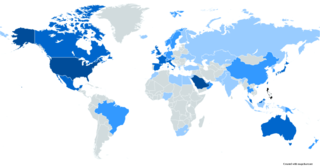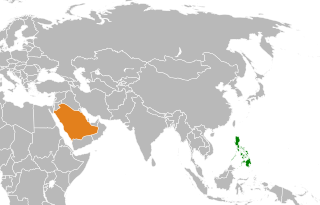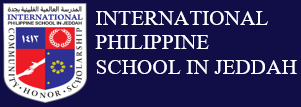
An Overseas Filipino is a person of full or partial Filipino origin who trace their ancestry back to the Philippines but are living and working outside of the country. They get jobs in countries and they move to live in countries. This term generally applies to both people of Filipino ancestry and citizens abroad. As of 2019, there were over 12 million Filipinos overseas.

Overseas Filipino Worker (OFW) is a term often used to refer to Filipino migrant workers, people with Filipino citizenship who reside in another country for a limited period of employment. The number of these workers was roughly 1.77 million between April and September 2020. Of these, female workers comprised a larger portion, making up 59.6 percent, or 1.06 million. However, this number declined to 405.62 thousand between 2019 and 2020.

Public education—from primary education through college—is open to every Saudi citizen. Education is the second-largest sector of government spending in Saudi Arabia. Saudi Arabia spends 8.8% of its gross domestic product on education, which is nearly double the global average of 4.6%. Islamic studies are part of the education system alongside scientific and social studies that vary from educational institution to another.

Serenata is a Philippine children's choir in Jeddah, Saudi Arabia.
Filipinos in the United Arab Emirates are migrants or descendants of the Filipinos living in the United Arab Emirates. 679,819 Filipinos live in the UAE, of which 450,000 live in Dubai, and they form 6.1% of the whole UAE population, and they form 21.3% of the population of Dubai. Dubai is home to the largest population of Filipinos in the UAE, followed by Abu Dhabi and Al Ain. In 2007, Filipinos in the UAE sent more than US$500 million in remittances back to the Philippines.
Filipinos in Palau consist of contract workers from the Philippines and their dependents living in Palau. The approximately 7,000 Filipinos living in Palau make up about 35% of the entire population of Palau, and make up the second-largest ethnic group after Palauans. In addition, the Tagalog language is the fourth most-spoken language in Palau.
Filipinos in Qatar are either migrants or descendants of the Philippines living in Qatar. Around 260,000 Filipinos live in Qatar, and frequently work in construction and service jobs. As of early 2017, Filipinos are estimated to be the fourth-largest group of foreign workers in Qatar, after Indians, Nepalis and Bangladeshis. With 56,277 Filipinos arriving between January and November 2008, Qatar is the third-largest destination of Overseas Filipino Workers (OFW's) in the Middle East after the United Arab Emirates and Saudi Arabia, and also the fourth-largest destination of OFW's worldwide. Despite this, and the removal of the Philippines from the pandemic-related travel-restriction "Red List" in August, 2022, Philippine nationals are unable to apply for Qatar tourist visas.
The labor migration policy of the Philippine government allows and encourages emigration. The Department of Foreign Affairs, which is one of the government's arms of emigration, grants Filipinos passports that allow entry to foreign countries. In 1952, the Philippine government formed the Philippine Overseas Employment Administration (POEA) as the agency responsible for opening the benefits of the overseas employment program. In 1995, it enacted the Migrant Workers and Overseas Filipino Act in order to "institute the policies of overseas employment and establish a higher standard of protection and promotion of the welfare of migrant workers and their families and overseas Filipinos in distress." In 2022, the Department of Migrant Workers was formed, incorporating the POEA with its functions and mandate becoming the backbone of the new executive department.
Filipinos in Oman are either migrants or descendants of the Philippines living in Oman. As of 2011, there are between 40,000 and 46,000 of these Filipinos in Oman. A large destination for Overseas Filipino workers (OFWs), Oman was the only Middle Eastern nation included on the Philippine Overseas Employment Administration's list of nations safe for OFWs. The country still holds the title up to this day.

The Libya–Philippines relations refers to the bilateral relationship between Libya and the Republic of the Philippines. Libya has an embassy in Manila and the Philippines has an embassy in Tripoli.

Philippines–Saudi Arabia relations are the bilateral relations between the Philippines and Saudi Arabia. Formal diplomatic relations between the two countries were established on October 24, 1969.

Oman–Philippines relations refers to the bilateral relations between Oman and the Philippines. Diplomatic relations between Oman and the Philippines were established on October 6, 1980. The Philippine embassy in Riyadh covered Oman until March 1992 when the Philippines established a resident embassy in Muscat. Oman's embassy in Kuala Lumpur covered the Philippines until the opening of the Omani embassy in Manila in July 2013.

Philippines–Poland relations are the bilateral relations between the Philippines and Poland. Formal diplomatic relations between the two countries were established on September 22, 1973, but contact between the two peoples dates back to the seventeenth century.

International Philippine School in Jeddah is a Philippine international school in Jeddah, Saudi Arabia. It serves levels pre-elementary through senior high school. As of 2005 it had over 1,000 students, making it the world's largest Philippine international school.

MariaSusana "Toots" Vasquez Ople was a Filipina politician and Overseas Filipino Workers' (OFW) rights advocate who served as the first Secretary of the Department of Migrant Workers.

Kuwait–Philippines relations refers to the bilateral ties of Kuwait and the Philippines.

Overseas Filipinos, including Filipino migrant workers outside the Philippines, have been affected by the COVID-19 pandemic. As of June 1, 2021, there have been 19,765 confirmed COVID-19 cases of Filipino citizens residing outside the Philippines with 12,037 recoveries and 1,194 deaths. The official count from the Department of Foreign Affairs (DFA) on the cases of overseas Filipinos is not included in the national tally of the Philippine government. Repatriates on the other hand are included in the national tally of the Department of Health (DOH) but are listed separately from regional counts.
Throughout the COVID-19 pandemic, the national and local governments of the Philippines have coordinated numerous international and domestic evacuations.

Imelda Macapundag Panolong is a Filipina career diplomat who is the current Ambassador of the Philippines to Oman. She is the first Muslim woman in the Philippine diplomatic corps to be promoted to the rank of Career Minister and later, Chief of Mission, Class II and also the first female Muslim ambassador of the Philippines. Before becoming ambassador, she served as the consul general of the Philippine Consulate in Jeddah, Saudi Arabia and has completed tours of duty in Pakistan, Bahrain, Canada, Indonesia and the United States.

The Embassy of the Philippines in Cairo is the diplomatic mission of the Republic of the Philippines to the Arab Republic of Egypt. Opened in 1960, it is currently located in the southern Maadi district of Cairo, near the Cairo American College.



















